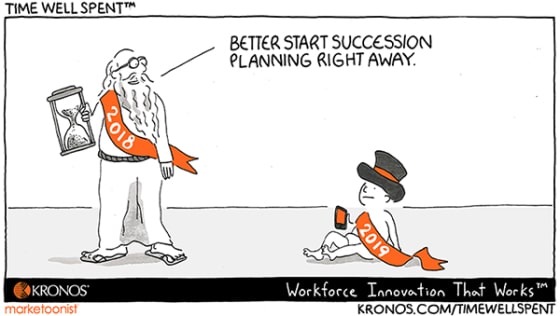Find and Train Your Replacement Through Succession Planning – Friday Distraction

The holiday season is behind us. That being said, this New Year’s themed Time Well Spent from our friends at Kronos shares a message we should embrace all year long. Organizations need to dedicate resources toward replacement and succession planning.
I know many companies don’t like to make this level of commitment to employees. They don’t want to say, “Joe, we’d like for you to become our next vice president of finance.” Because what happens if Joe does something crazy and the company changes their mind? Organizations figure if we don’t commit to Joe, then we don’t put ourselves in that position.
But here’s the deal. What happens if Joe comes into your office next week and resigns? Or decides to retire? Companies need to prepare for these issues. Here are a few things to consider:
Organizations need to think about knowledge management. Let’s put the succession planning argument to the side for a moment. With unemployment at record lows, employees are testing the job market. Companies need to think about their key employees and the work they do. What happens if those employees decide to leave? Companies should be thinking about cross-training to make sure their history and knowledge is passed along.
Internal talent pools can be a viable alternative to replacement and succession planning. If the only hold-up to talent planning is committing to employees, organizations can create talent pools. These employee “pools” create opportunities for development without specific job commitment. Using the example above, the company can tell Joe, “You have a future with us. We don’t know all the details, but we’d like to start developing you for the future.”
If companies are worried about employee retention, then they need to do something about it. I’m going to deliver some tough love here. Companies that want to engage and retain employees need to take actions that will do so. It’s not logical to expect employee retention without competitive wages, training and development, and positive workplace relations. Telling employees they have a future is part of that.
The conversation about succession planning is about more than avoiding one unpleasant conversation with an employee. It’s about talent management. Organizations will not be able to achieve their talent management goals if they don’t think holistically about current and future talent. That includes training, development, knowledge management, and talent planning.